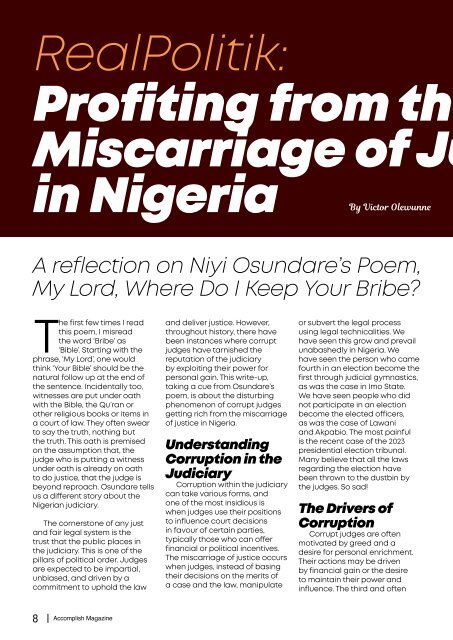ACCOMPLISH MAGAZINE NOV 2023
Mo Ibrahim: On Ethical Leadership In Africa
Mo Ibrahim: On Ethical Leadership In Africa
Create successful ePaper yourself
Turn your PDF publications into a flip-book with our unique Google optimized e-Paper software.
RealPolitik:<br />
Profiting from the<br />
Miscarriage of Ju<br />
in Nigeria<br />
By Victor Olewunne<br />
A reflection on Niyi Osundare’s Poem,<br />
My Lord, Where Do I Keep Your Bribe?<br />
The first few times I read<br />
this poem, I misread<br />
the word ‘Bribe’ as<br />
‘Bible’. Starting with the<br />
phrase, ‘My Lord’, one would<br />
think ‘Your Bible’ should be the<br />
natural follow up at the end of<br />
the sentence. Incidentally too,<br />
witnesses are put under oath<br />
with the Bible, the Qu’ran or<br />
other religious books or items in<br />
a court of law. They often swear<br />
to say the truth, nothing but<br />
the truth. This oath is premised<br />
on the assumption that, the<br />
judge who is putting a witness<br />
under oath is already on oath<br />
to do justice, that the judge is<br />
beyond reproach. Osundare tells<br />
us a different story about the<br />
Nigerian judiciary.<br />
The cornerstone of any just<br />
and fair legal system is the<br />
trust that the public places in<br />
the judiciary. This is one of the<br />
pillars of political order. Judges<br />
are expected to be impartial,<br />
unbiased, and driven by a<br />
commitment to uphold the law<br />
and deliver justice. However,<br />
throughout history, there have<br />
been instances where corrupt<br />
judges have tarnished the<br />
reputation of the judiciary<br />
by exploiting their power for<br />
personal gain. This write-up,<br />
taking a cue from Osundare’s<br />
poem, is about the disturbing<br />
phenomenon of corrupt judges<br />
getting rich from the miscarriage<br />
of justice in Nigeria.<br />
Understanding<br />
Corruption in the<br />
Judiciary<br />
Corruption within the judiciary<br />
can take various forms, and<br />
one of the most insidious is<br />
when judges use their positions<br />
to influence court decisions<br />
in favour of certain parties,<br />
typically those who can offer<br />
financial or political incentives.<br />
The miscarriage of justice occurs<br />
when judges, instead of basing<br />
their decisions on the merits of<br />
a case and the law, manipulate<br />
or subvert the legal process<br />
using legal technicalities. We<br />
have seen this grow and prevail<br />
unabashedly in Nigeria. We<br />
have seen the person who came<br />
fourth in an election become the<br />
first through judicial gymnastics,<br />
as was the case in Imo State.<br />
We have seen people who did<br />
not participate in an election<br />
become the elected officers,<br />
as was the case of Lawani<br />
and Akpabio. The most painful<br />
is the recent case of the <strong>2023</strong><br />
presidential election tribunal.<br />
Many believe that all the laws<br />
regarding the election have<br />
been thrown to the dustbin by<br />
the judges. So sad!<br />
The Drivers of<br />
Corruption<br />
Corrupt judges are often<br />
motivated by greed and a<br />
desire for personal enrichment.<br />
Their actions may be driven<br />
by financial gain or the desire<br />
to maintain their power and<br />
influence. The third and often<br />
8<br />
Accomplish Magazine

















